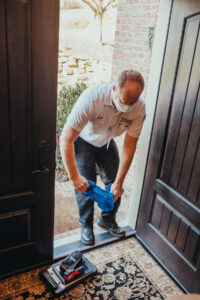When to Call A Plumber For A Toilet Clog
Let’s be honest here—we’ve all had that moment. You know the one. You flush, and instead of the satisfying whoosh of water disappearing, you get… nothing. Or worse, you get that slow, ominous rise that makes your heart skip a beat and your brain go into panic mode.
I’ve been in the plumbing business for nearly two decades now, and trust me when I say that toilet clogs are probably the most awkward calls I get. Nobody wants to discuss what went wrong in their bathroom, but hey, that’s what I’m here for.
The question isn’t whether toilet clogs happen—they absolutely do. The real question is when you should roll up your sleeves and tackle it yourself versus when you need to call a plumber.
The “Try This First” Approach
Look, I’m not going to call a plumber for every little hiccup, and neither should you. Some clogs are just part of life, especially if you’ve got kids or, let’s face it, if you’re a little too generous with the toilet paper.
Before you think about picking up that phone to call a plumber, grab your plunger. But not just any plunger—get yourself a proper toilet plunger with that rubber flange thing. Those flat sink plungers? They’re about as useful as a chocolate teapot when it comes to toilets.
Give it some good, firm plunges. Not those wimpy little pushes, but really commit to it. Sometimes you’ll hear this satisfying “glub” sound, and boom—problem solved. Water goes down, crisis averted, and you can go back to pretending this never happened.
If plunging doesn’t work, try the dish soap trick. Squirt a generous amount into the bowl, let it sit for maybe ten minutes, then follow up with a bucket of hot water. Not boiling—that can crack your porcelain—but nice and hot. This sometimes loosens up whatever’s causing the backup.
Red Flags That Scream “Call A Plumber”
Now here’s where things get interesting, and by interesting, I mean potentially expensive if you ignore the warning signs.
When Plunging Becomes Your Part-Time Job
If you’re plunging the same toilet every few days, something’s not right. I had one customer who was plunging twice a week for two months before they finally decided to call a plumber. Turns out they had tree roots that had basically turned their main line into a botanical garden. One-off clogs? Normal. Chronic clogs? That’s your toilet trying to tell you something important.
The Dreaded Multi-Drain Backup
This is a big one, folks. If you flush your toilet and your shower starts gurgling, or your bathroom sink suddenly backs up, you need to call a plumber immediately. Don’t pass go, don’t collect $200, just pick up that phone.
What you’re dealing with isn’t a toilet problem—it’s a main sewer line problem. And those don’t get better with time or wishful thinking.
Smells That Make You Question Your Life Choices
Toilets shouldn’t smell like a swamp in August. If you’re getting sewer gas odors coming from your toilet, even when it’s not clogged, you need to call a plumber. That smell isn’t just unpleasant—it can actually be dangerous.
I’ve traced these smells to everything from cracked vent pipes to damaged wax rings. Not exactly DIY territory.
The Overflow Situation
Let me paint you a picture: You plunge. Water goes everywhere. You plunge again. More water. Your bathroom floor is now a crime scene, and you’re standing there like a deer in headlights.
Stop. Just stop.
Turn off the water supply to the toilet (there’s usually a valve behind it), grab some towels, and call a plumber. I’ve seen people turn a minor clog into major water damage because they kept trying to force the issue.
What Actually Happens When You Call A Plumber
Here’s the thing—when you finally decide to call a plumber, we’re not just showing up with a fancy plunger and charging you $200. Well, I’m not, anyway.
First, we’re going to listen. What have you tried? When did this start? Is this a new problem or an ongoing saga? This helps us figure out what we’re dealing with before we even look at the toilet.
Then we’re going to inspect everything. Not just the toilet, but the whole system. Are other drains affected? Is the main line backing up? Sometimes what looks like a toilet problem is actually something much bigger.
If it’s a simple clog, we’ve got tools that can handle pretty much anything. Toilet augers, hydro-jetters, drain snakes that would make your hardware store snake look like a toy. We can usually clear the blockage and get you back to normal pretty quickly.
But here’s where the real value comes in—we can tell you why it happened and how to prevent it from happening again.
Things That Make Plumbers Shake Their Heads
You want to know when you should definitely call a plumber? When you’ve flushed something you shouldn’t have and now you’re pretending it didn’t happen.
Kids’ toys, feminine hygiene products, those “flushable” wipes that absolutely are not flushable—I’ve pulled all of this stuff out of toilets. The sooner you call a plumber after these incidents, the easier (and cheaper) it is to fix.
I once had a customer who waited three weeks to call a plumber after their toddler flushed a small toy car. By the time I got there, the backup had caused damage to the flooring. Don’t be that person.
The “But It’s Working Now” Trap
Here’s something that drives me crazy: people who experience a major backup, manage to get it flowing again temporarily, and then just… ignore it. If your toilet completely stopped working and then mysteriously started working again without any real intervention, you should still call a plumber. That blockage probably didn’t magically disappear—it likely just shifted deeper into your system where it’s going to cause bigger problems later.
Prevention vs. Reaction
The best time to call a plumber isn’t when your toilet is backing up—it’s before that happens. Annual drain maintenance, especially if you live in an older home or have had problems before, can save you from those 2 AM emergency situations.
But let’s be realistic. Most people don’t think about their plumbing until something goes wrong. That’s human nature.
The Bottom Line
Look, you don’t need to call a plumber every time your toilet hiccups. But you also shouldn’t treat persistent problems like they’re just part of life.
Trust your instincts. If something seems off, if the same problem keeps happening, or if you’re dealing with anything that affects other drains, it’s time to call a plumber.
We’ve seen it all, fixed it all, and we’re not going to judge you for whatever we find down there. Well, maybe a little, but we’ll keep it to ourselves.
The key is knowing when you’re in over your head and when professional help will actually save you time, money, and a whole lot of frustration. Because nobody wants to spend their weekend wrestling with a toilet when they could be doing literally anything else.
